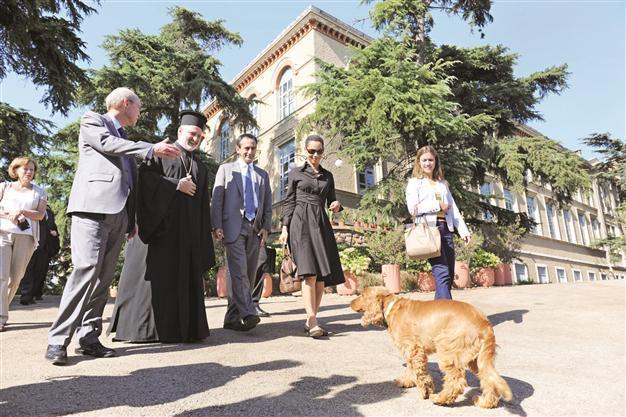No US nod to Kurdish rule
Cansu Çamlıbel ISTANBUL / Hürriyet

US Assistant Secretary of State for European and Eurasian Affairs Philip Gordon (3rd L) and his wife, Rachel (4th L), interact with a dog in the garden of Halki Seminary. DAILY NEWS photo, Emrah GÜREL
U.S. Assistant Secretary of State for European and Eurasian Affairs Philip Gordon visited Istanbul after his tour of Balkans and Greece. Having a round-table meeting with a group of journalists including Hurriyet, he made clear statements for Kurdish formation in Syria. Gordon stated that they did not anticipate an autonomous Kurdish region in Syria’s future, adding that they favored the protection of Syria’s territorial integrity and explained it to
Turkey in a clear way.
“Syria has a huge priority for both of us. We are coordinating very well on the question of Syria. I think we have very similar interests. Some time ago we came to the conclusion you could not have stability inside Syria under the al-Assad regime. That regime needs to go,” Gordon said. “We are working with other members of the international community to increase pressure on the regime to ensure a political transition and to coordinate our efforts and assistance to the opposition so that when al-Assad does go - and we are confident that he will - we can ensure a stable and inclusive, democratic Syria. That is one of our top priorities and something we are coordinating very closely with the Turkish government,” he added.
“I think the U.S. can be clear on several things regarding the
Kurds. When we say that the Syrian opposition needs to be inclusive, it is to give a voice to all of the groups in Syria, and that includes Kurds. There is no question about that and as we seek to work and coordinate with opposition, that includes Kurdish voices. But for the future of Syria we don’t see an autonomous Kurdish area or territory. We want to see a Syria that remains united and we have been clear both with the Kurds of Syria and our counterparts in Turkey that we don’t support any movement towards autonomy or separatism. We are very clear about that,” Gordon said about the autonomous Kurdish region in northern Syria.
“I wouldn’t accept that there has been inaction. We have been very active in doing two main things; putting diplomatic pressure on the regime and enhancing our support for the opposition. Every situation is different. So saying international community did one thing in Libya and why not doing it in Syria,” he said.
Gordon also referred to Syria’s downing of the Turkish jet last month. “We have been pretty clear about this incident, Secretary of State Clinton put out a statement on what our view is. We stand by our NATO ally in solidarity. We denounced this act of the Syrian regime, shooting a plane down and killing Turkish pilots and that is that,” he said.
“Everything we know is that it was a violent act by the Syrian side. We never will probably have 100 percent information on how and what exactly happened in a situation like this. What we do understand to be the case is that without warning Syria shot down the Turkish plane. That much we are pretty clear about. That would be one the examples of regime’s disregard for the human life and willingness to kill. That is why we were so clear in our statement,” he said.
Gordon also touched on the subject of freedom of expression, which has been an issue of concern in Turkey recently. “She [Hilary Clinton] even said publicly that Turkey, like any country, can’t fulfill its democratic process unless there is free flow of information. ” he said.
GORDON PAYS VISIT TO HALKI SEMINARY
VERCİHAN ZİFLİOĞLU
ISTANBUL-HURRIYET DAILY NEWS
U.S. Assistant Secretary of State for European and Eurasian Affairs Philip Gordon yesterday visited Istanbul’s Halki Seminary, of which re-opening has long been debated after a 4-day long official visit he made to Greece. “Reopening of the Halki seminary will positively effect Turkey in terms of freedom of religion and democracy,” Gordon said during his visit to the seminary.
Gordon paid a short visit to Fener Greek Patriarchate first, and then headed to Heybeliada Halki seminary. Gordon stated that the U.S. was closely following the developments about the Halki seminary issue. “Reopening of the Halki seminary will positively effect Turkey in terms of freedom of religion and democracy,” Gordon said. After the meeting, Gordon answered questions of the press. He commented on the seminary building, stating that he wandered in the building and liked it so much. He also underlined that he personally followed the developments about the issue. In the meeting, which was closed to the press, a great confidentiality was kept while choosing photographers and journalists. The seminary, which was the main center of Orthodox Greek theological was closed in 1971.
Kurdistan,
